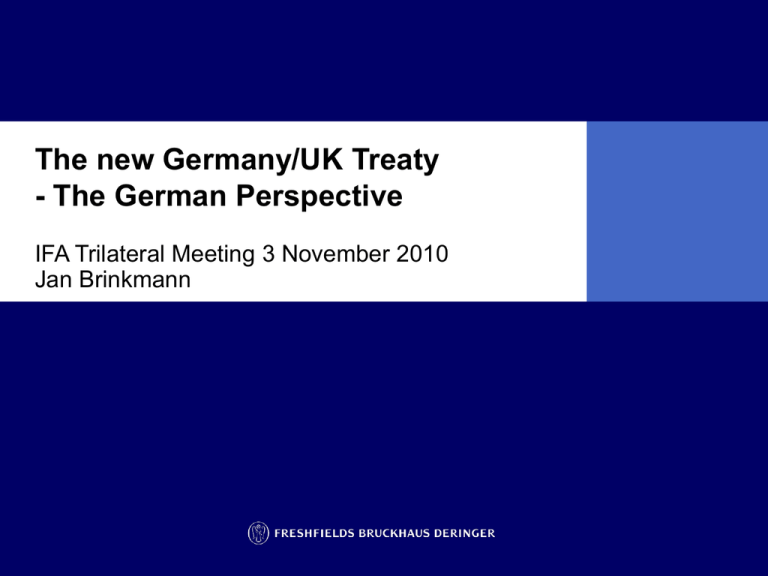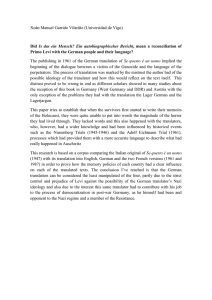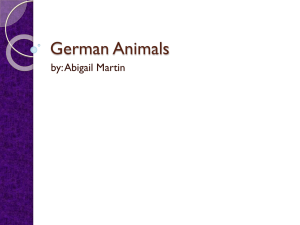Dr. Jan Brinkmann - IFA-UK
advertisement

The new Germany/UK Treaty - The German Perspective IFA Trilateral Meeting 3 November 2010 Jan Brinkmann Overview German treaty policy The Germany/UK Treaty Anti avoidance — ‘Subject to tax’ condition for German tax exemption — Limitation of relief for income/gains not taxed in the UK on ‘remittance basis’ — Anti treaty shopping provisions — ‘Switch-over’ rules Other changes — Reduction of German dividend withholding tax — Pensions, annuities and similar payments 1 German treaty policy German treaty policy Objectives not only avoidance of double taxation but also avoidance of — double non-taxation, — tax evasion and — tax avoidance 3 German treaty policy (2) Methods for the avoidance of double taxation Exemption method (subject to the right to take exempt income/gain into account when determining the tax rate) — e.g. (active) business income, income/gains from immovable property, income from employment — also domestic exemptions (e.g. dividends) Credit method — e.g. portfolio dividends, interest, royalties — preferred method for treaties with low tax jurisdictions 4 German treaty policy (3) Switch over clauses — non-active business income, conflicts of qualification, double nontaxation — treaty rules and domestic rules — problem: underdeveloped domestic tax credit rules Mutual agreement and arbitration — general willingness to provide for MAP/arbitration clauses along the lines of article 25 OECD-MC (2008) 5 The Germany/UK Treaty Anti avoidance Subject to tax clause Exemption of UK source income from German tax Only if ‘effectively taxed’ in the UK (article 23 (1) a)) Applies to all items of income and gain Example — German-resident individual invests (whether directly or through transparent funds) in UK real estate — Effective elimination of UK tax charge by personal allowance — Non-taxation by virtue of personal allowances should not be caught under subject to tax clause. 7 UK remittance basis and relief from German tax at source The UK as ‘low tax jurisdiction’ for resident but non domiciled persons New ‘limitation of relief’ provision (article 24) All items of German source income and gain that are taxable in the UK in principle under the treaty but which are not effectively taxed in the hands of a UK resident because the UK resident benefits from ‘remittance basis’ taxation will not be relieved from source taxation in Germany likely to have a broader effect than existing provision (article II (2)) — applies to income and gains (from German sources) benefitting from remittance basis taxation in the UK — no longer expressly conditional on the income being subject to tax in the other territory under the treaty 8 UK remittance basis and relief from German tax at source (2) Practical relevance investment income from German sources (as under old treaty) capital gains from alienation of shares in German companies (1% minimum holding) employment income from German sources (dual contract cases) in addition: for former German tax residents: — remain subject to German tax for 5 years with certain items of income/gain — capital gains from alienation of German real estate, shares, debt instruments 9 Anti treaty shopping Main purposes clauses in articles on dividends, interest, royalties and other income Novelty from a German perspective Germany traditionally attacks treaty shopping under – rather mechanical domestic rules domestic rule has been challenged by European Commission 10 Anti treaty shopping (2) Joint declaration ‘[…] it is understood that this Convention shall not be interpreted to mean that a Contracting State is prevented from applying its domestic legal provisions on the prevention of tax evasion or tax avoidance where those provisions are used to challenge […] an abuse of the Convention. […] an abuse of the Convention takes place where a main purpose for entering into certain transactions is to secure a more favourable tax position […]’ -> less mechanical approach than under German domestic law 11 ‘Switch-over’ rules for German relief from double taxation Switch over form exemption to credit method (article 23 (1) c) and e)) for passive business profits of a UK permanent establishment dividends where underlying profits are derived from passive income — treaty exemption is of little importance as domestic participation exemption and Parent Subsidiary Directive apply — relevant where domestic exemption does not apply and minimum holding periods (Parent Subsidiary Directive) are not satisfied categorisation/attribution conflicts that would otherwise have resulted in ‘white income’ (unless conflict is resolved under MAP) German domestic law provides for unilateral switch over to credit method for categorisation/attribution conflicts 12 Third country permanent establishments Third country permanent establishments of German enterprises Relief from UK source tax available only if combined tax in Germany and third country is not less than 60% of German tax (section 3 of the protocol) Even if conditions for above relief are not satisfied, UK withholding tax is limited to 15% Anti avoidance rule does not apply to income derived from an active conduct of a trade or business Improvement on current position where ‚subject to tax‘ condition may result in denial of treaty protection 13 The Germany/UK Treaty Other changes Dividend withholding tax reduction of German source taxation to 5% for dividends paid to a company that holds at least 10%of the companies capital 10%for dividends paid to qualifying ‚pension schemes‘ 15% in all other cases No specific rules for REIT dividends 15%/10% rate applies 5% rate effectively excluded/penalized under domestic law German source income on profit related debt instruments may be subject to WHT (section 2 of the protocol) 15 Pension, annuities and similar payments Significant deviation from OECD-MC (2008) Rule: State of residency Exceptions — payments under social insurance legislation — payments for which tax relief on contribution was granted for more than 15 years Background — Change of German system regarding taxation of pensions 15 years period appears to be compromise New German policy? 16 Mutual agreement procedure Mutual agreement procedure (article 26) Broadly following the OECD-MC (2008) model Mandatory arbitration clause — Incentive to reach agreement during MAP within reasonable time (2 years) — No arbitration in case a decision has been rendered by a court or an administrative tribunal — Procedure shall be agreed upon by competent authorities. 17 © Freshfields Bruckhaus Deringer LLP 2010 This material is for general information only and is not intended to provide legal advice. 18








